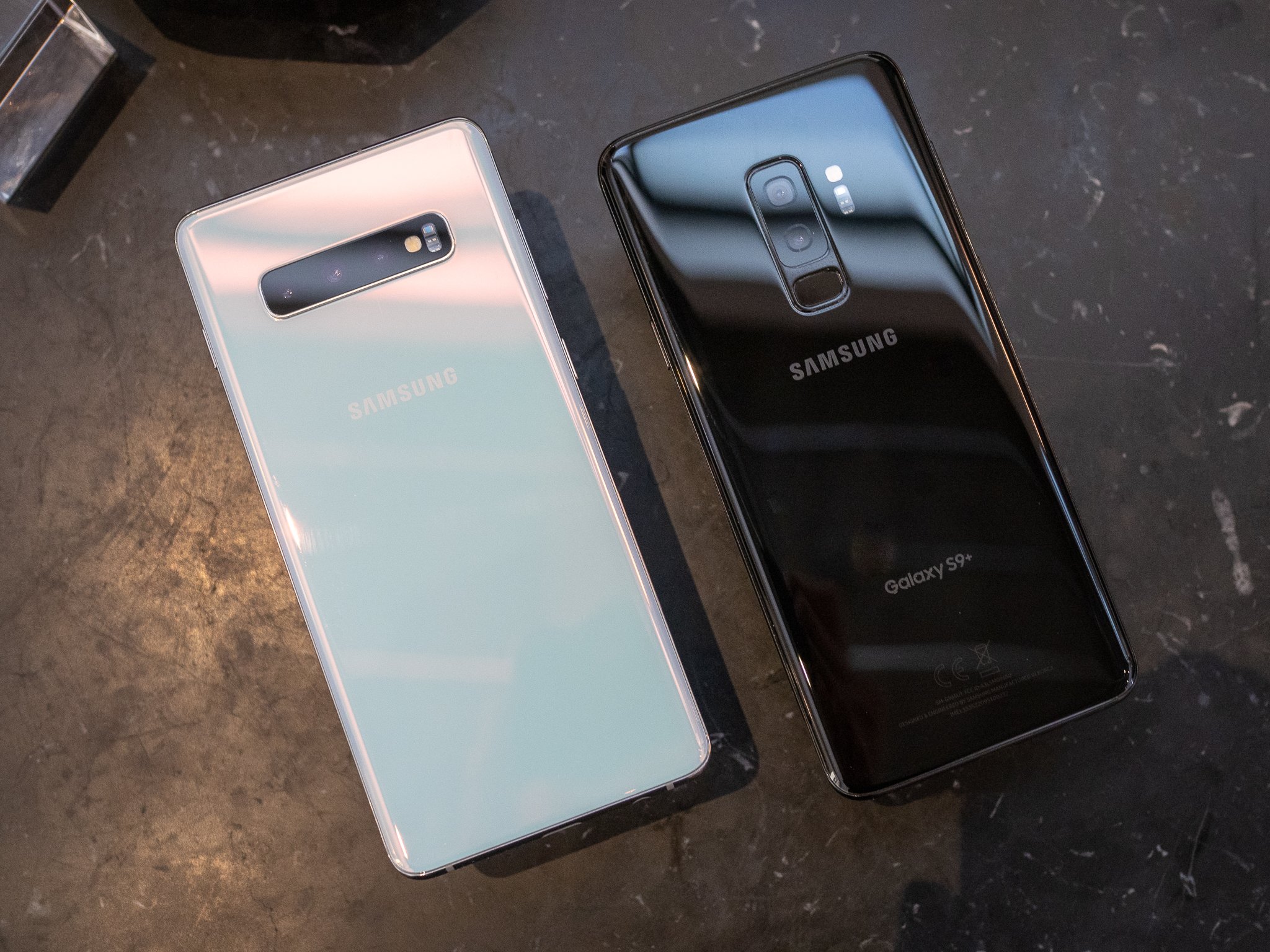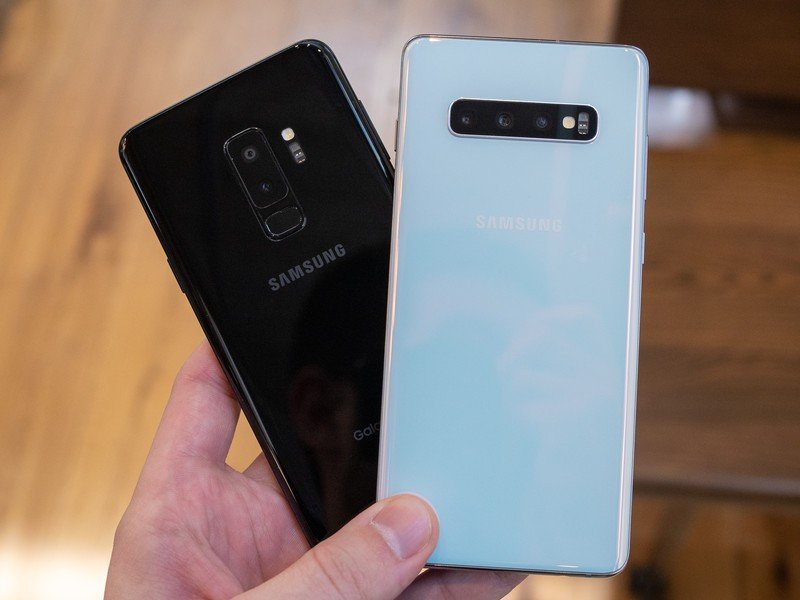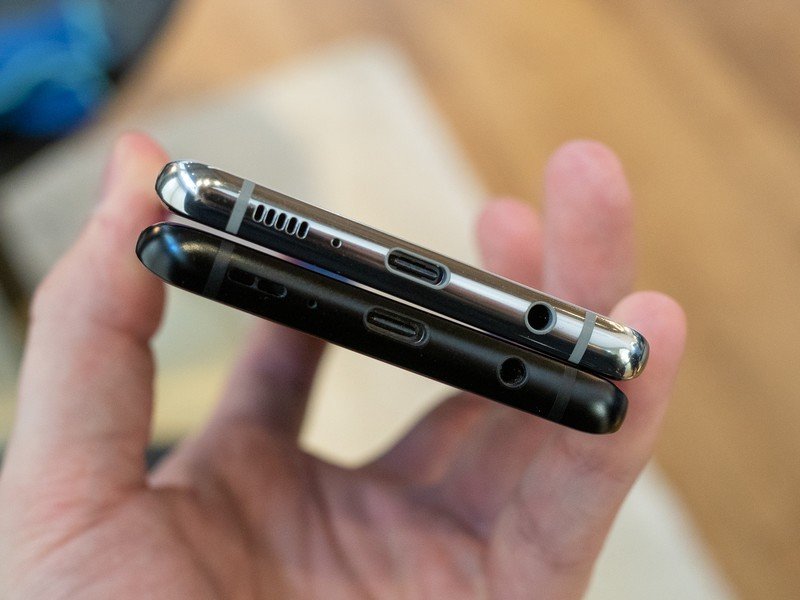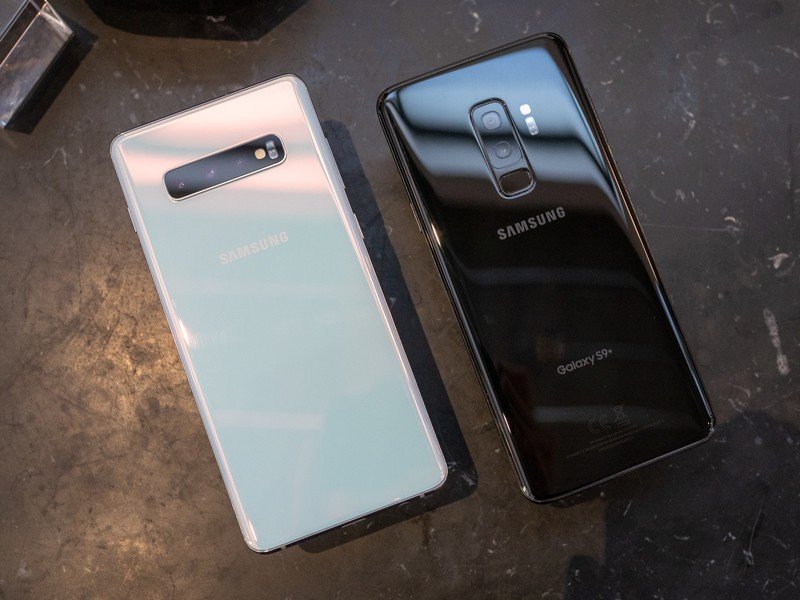Galaxy S10 vs. Galaxy S9: Should you upgrade?

Best answer: The upgrade to a Galaxy S10 or S10+ is worth it, but you'll pay quite a bit for the privilege. You'll see benefits in performance, camera capabilities and battery life by moving to the new phone; but you'll probably pay about $600 for the upgrade when factoring in a sale or trade-in of your current Galaxy S9 or S9+. Closely analyze exactly what you get before making the decision to buy.
- Samsung: Samsung Galaxy S10 ($750 at Samsung)
- Samsung: Samsung Galaxy S10+ ($850 at Samsung)
What you get with a Galaxy S10 or S10+ upgrade
Much of what makes the Galaxy S10 and S10+ worthy upgrades over the S9 and S9+ simply comes down to the steady march of yearly technology upgrades. The new models have a faster, more capable and more efficient Snapdragon 855 processor, which isn't necessarily noticeable in day-to-day use but will show its edge when you're hitting the phone hard — particularly in another year when apps and software become ever more power-hungry. The same goes for the new displays, which are ever-so-slightly larger (mostly just in height) but the same effective resolution as their predecessors — you get a better-looking display, and more of it, but the improvements are somewhat marginalized because the Galaxy S9 and S9+ already have great displays.
You'll see improvements in performance, subtly at first and substantially later down the road.
Then you have some of the other areas where Samsung made great decisions to bump up the internal specs that will affect how you use the phones every day. You now get 8GB of RAM in either the Galaxy S10 or S10+, which is a big upgrade in particular for the Galaxy S9's measly 4GB. This will directly attribute to more capable multitasking and smoother gameplay in serious games, and will guarantee you won't run into issues using the phone for two more years as software and apps get more demanding. Storage, too, has been increased — at least, if you only have the base model Galaxy S9 or S9+ currently. Bumping up to 128GB will feel wonderful if you've been struggling with internal storage; but if you already opted for the 128GB model before, there's nothing to gain here.
| Header Cell - Column 0 | Galaxy S9 | Galaxy S10 | Galaxy S9+ | Galaxy S10+ |
|---|---|---|---|---|
| Operating System | Android 9 Pie | Android 9 Pie | Android 9 Pie | Android 9 Pie |
| Display | 5.8-inch AMOLED2960x1440 (18.5:9) | 6.1-inch AMOLED3040x1440 (19:9) | 6.2-inch AMOLED2960x1440 (18.5:9) | 6.4-inch AMOLED3040x1440 (19:9) |
| Processor | Snapdragon 845or 10nm Samsung Exynos | Qualcomm Snapdragon 855 | Snapdragon 845or 10nm Samsung Exynos | Qualcomm Snapdragon 855 |
| Storage | 64GB128GB256GB | 128GB512GB | 64GB128GB256GB | 128GB512GB1TB |
| Expandable | microSD | microSD | microSD | microSD |
| RAM | 4GB | 8GB | 6GB | 8GB12GB |
| Rear Camera | 12MP Dual Pixel, f/1.5-2.4OIS | 12MP Dual Pixel, f/1.5-2.4OIS | 12MP Dual Pixel, f/1.5-2.4OIS | 12MP Dual Pixel, f/1.5-2.4OIS |
| Rear Camera 2 | n/a | 12MP 45° FOV, f/2.4OIS | 12MP, f/2.4OIS | 12MP 45° FOV, f/2.4OIS |
| Rear Camera 3 | n/a | 16MP 123° FOV, f/2.2fixed focus | n/a | 16MP 123° FOV, f/2.2fixed focus |
| Front Camera | 8MP, f/1.7auto focus | 10MP Dual Pixel, f/1.9auto focus | 8MP, f/1.7auto focus | 10MP Dual Pixel, f/1.9auto focus |
| Front Camera 2 | n/a | n/a | n/a | 8MP, f/2.2auto focus |
| Battery | 3000mAh | 3400mAh | 3500mAh | 4100mAh |
| Charging | USB-CFast chargingFast Wireless charging | USB-CFast chargingFast Wireless charging 2.0Wireless PowerShare | USB-CFast chargingFast Wireless charging | USB-CFast chargingFast Wireless charging 2.0Wireless PowerShare |
| Water resistance | IP68 | IP68 | IP68 | IP68 |
| Security | Capacitive fingerprint sensorIris scanner | In-screen fingerprint sensor | Capacitive fingerprint sensorIris scanner | In-screen fingerprint sensor |
| Dimensions | 147.7 x 68.7 x 8.5 mm163 g | 149.9 x 70.4 x 7.8 mm157 g | 158.1 x 73.8 x 8.5 mm189 g | 157.6 x 74.1 x 7.8 mm175 g |
Battery life takes a jump, and the cameras are more versatile.
Battery capacity, and therefore battery life, is taking a jump this year too. Once again you'll notice this the most on the Galaxy S9, which sometimes flew a bit too close to the sun when it came to battery longevity. The extra 400mAh, paired with the more efficient processor, should push the Galaxy S10 to (at least) the same great battery life standards we saw on the Galaxy S9+. And the massive 4100mAh battery on the Galaxy S10+ will be a true power user's dream. Samsung even managed to increase the speed of wireless charging on the new phones, which now nearly matches the wired charging speeds.
The camera is the last big change. While the photo quality of the main camera isn't notably improved, it's all of the supporting cameras and features that make a leap. There's a new ultra-wide camera on the back to take in large scenes, improved video stabilization, HDR10+ video capture, and a new NPU (Neural Processing Unit) for better scene detection and overall photo quality. The improvement in camera capabilities is even more pronounced when comparing the S9 and S10, because the S9 doesn't even have a secondary telephoto camera. On the front, you'll find a new and improved 10MP camera sensor for even better selfies, and the Galaxy S10+ has a secondary front-facing camera for portrait mode effects.
What isn't all that different
Be an expert in 5 minutes
Get the latest news from Android Central, your trusted companion in the world of Android




The fact that Samsung keeps many of its core features in tact from generation to generation is one of the company's biggest strengths. It also ends up being a weakness, because so much of what makes the new phone appealing is already represented in its predecessor.
Many of the Galaxy S10's core tenets are already in your hands with the Galaxy S9.
Many of the Galaxy S10 and S10+'s core tenets are already in your hands with the Galaxy S9 or S9+: water resistance, a headphone jack, stereo speakers, expandable storage and fast charging, to name a few. The Galaxy S10 and S10+ have great displays, but the Galaxy S9 and S9+ still look gorgeous even by 2019 standards. While Samsung's batteries got appreciably larger, its wired charging speeds didn't make a proportionate jump. The great metal-and-glass build of the Galaxy S9 and S9+ is carried over almost perfectly to the new phones, save for a few new design flourishes.
You'll also find that most of the new features touted on the Galaxy S10 and S10+ can be found in the software update to Android 9 Pie, with the new One UI interface, that's available for older phones as well. With the latest software on your older phone, you may feel a bit less inclined to jump to the new model.
Who should upgrade to a Galaxy S10 or S10+?
Part of the decision to upgrade from a Galaxy S9 or S9+ to a new S10 or S10+ will come down to how much you can expect to get when selling or trading in your current phone. The Galaxy S10 and S10+ are more expensive than their predecessors, and at the same time, Galaxy S9 and S9+ values have fallen sharply now that the new phones are available. You may get $300-400 for your Galaxy S9 or S9+ selling privately, and trading in to Samsung, a carrier or reseller will likely net you the same — so you'll be making up the roughly $600 difference to get the new phone.
For that extra money, you're getting a few noteworthy improvements. The camera capabilities have been improved, battery life will impress you, and there are some extra novelty features like reverse wireless charging, an in-display fingerprint sensor, and faster wireless charging. The daily experience of using the phones won't differ drastically, but if you're the type of person to eyeball this one-year upgrade, you owe it to yourself to look at all of the details and consider this move to a new Galaxy S10 or S10+.

A great all-around phone that's a solid step up from the Galaxy S9
Of the two comparisons, the Galaxy S10 is the larger upgrade from the S9. It moves up to a complete triple camera setup, and has a considerably larger battery, which are both important for daily use. And it's effectively the same as the Galaxy S10+ in a smaller size.

A tougher call to make considering the cost, but worth it if you're a Samsung fan.
The Galaxy S9+ is still a super-capable phone, and looks good even through the lens of 2019 flagships. But for Samsung fans, the Galaxy S10+ offers new capabilities, even longer battery life, a few neat features, and the allure of higher storage and RAM.
Andrew was an Executive Editor, U.S. at Android Central between 2012 and 2020.

